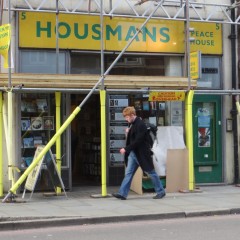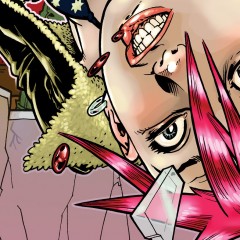Stuart Hall’s Library
by Joseph Brooker The pioneering sociologist and intellectual Stuart Hall died in 2014. He played a crucial part in developing the Centre for Contemporary Cultural Studies at Birmingham in the 1960s and 1970s, and for decades offered an inspiring and instructive influence with his writings on identity, representation and politics. Unsurprisingly he left behind an extensive library of the books, journal and papers that he had acquired over the decades. His widow Catherine Hall is now distributing this material: some of it, I understand, to an archive in Warwick. Some of the rest has been donated to the radical Housmans bookshop on Caledonian Road, for recirculation into the world of readers. Informed of this by my colleague Dr Blacklock, I took an hour off in the blazing May sunshine and walked over to Caledonian Road, naturally reminded of The Shop Assistants’ ‘Caledonian Road’ (which was released on vinyl the month before Hall’s ‘No Light at the End of the Tunnel’, a powerful survey of Thatcherism in its pomp, appeared in Marxism Today). Housman’s general stock is high quality: contemporary novels, a lot of science fiction, politics and theory, the latest n+1 and Believer and lesser-known magazines too; plus postcards and badges with the E.P. Thompson-era slogan Protest & Survive. The general second-hand stock in the basement is very interesting and cheap too. Pierre Macherey’s ATheory of Literary Production was here for £3, a book that seemed a great prize when I was an undergraduate but is perhaps no longer read (come to think of it, it was no longer read when I was an undergraduate); perhaps I should have bought this copy, as my own (£2.75 from a student bookshop) came with an affixed Mr Men sticker that I always struggled to realize was not supposed to be part of the front cover. But today was about Stuart Hall’s library. A selection of books were displayed on tables in the middle of the basement. A less prized set were going cheaper from a trolley. A great deal of what had come in had evidently already been bought up. Where are Hall’s copies of The Uses of Literacy or The Long Revolution? Gone either to the archive or to the first collectors to raid these displays. Yet here were nuggets still. Hall’s copies of two titles from Richard Hoggart, his great colleague at Birmingham. At least four books by global intellectuals of the next generation down from Hall’s, inscribed by them to him with thanks for his inspiration. One significant figure in the development of cultural studies signed their own book for Hall with an elegant tribute: Acknowledging many debts...
Talking Shop: Dr Harriet Earle
This is the first of a new series of interviews in which we invite people working in the contemporary field to tell us about their work and share their sense of what's interesting. Dr Harriet Earle is currently an Associate Lecturer at Birkbeck, whose book on trauma and conflict in comics will be published in 2017. CCL: Do you think there is now a comics canon? (Or would you use a different term?) If so, what's in it? And who makes it? — artists, publishers, fans, academics? Is there, for instance, a distinct academic canon of comics that is different from other canons? Harriet: Canon is a good word – we can use that. As for what’s in it… all the comics that even non-comics-readers have heard of! Spiegelman’s Maus, Moore and Gibbons’ Watchmen, and Miller’s The Dark Knight Returns are three key texts that were all published in 1986 – something of a big year for comics – and a good starting point for any discussion of the canon. More recent additions would include Thompson’s Blankets, Bechdel’s Fun Home and Gaiman et al’s (mind-blowingly brilliant) series The Sandman. There are some artists whose entire corpus is worthy of a place in the canon: Sacco and his comics journalism, Alan Moore, Grant Morrison, Chris Ware, Frank Miller and Bryan Talbot. As for who makes it? Who makes any canon? It’s a tricky question because there are so many threads to it. However, with comics I think there’s another angle that does particularly interesting things to the comics canon – awards. There are many comics awards that are prestigious within the field but these are rarely mentioned anywhere except the jackets of the books (and comics-specific press coverage). What people do hear about is when a comic is honoured in a non-comics specific forum. Maus won a Pulitzer in 1992, Watchmen was the only graphic novel to appear on Time's 2005 "All-Time 100 Greatest Novels" list and Persepolis ranked #5 on Newsweek’s list of the ten best fiction books of the decade. This is not to say they aren’t well-crafted narratives that deserve recognition, but the recognition they do get seems above and beyond that which, say, an Eisner Award winner would receive because they have broken out of their own category. As for a distinct academic canon – I don’t know if it would differ too greatly from the ‘general’ comics canon. We’re still squeamish about giving superhero narratives too much kudos (despite there being some brilliant superhero comics out there – Magneto: Testament, Arkham Asylum: A Serious House on Serious Earth and Tank Girl) so these tend to be missing (or at least under-represented)...



Recent Comments